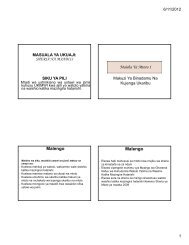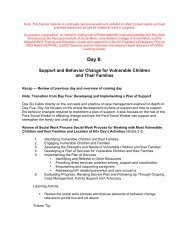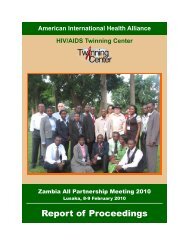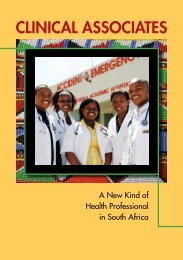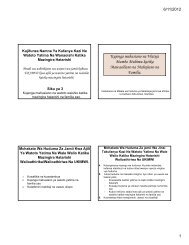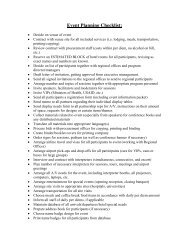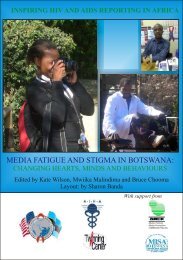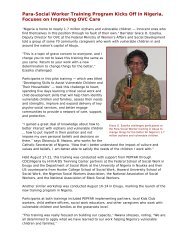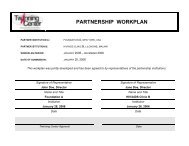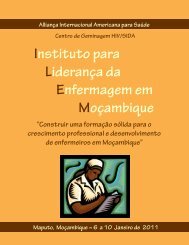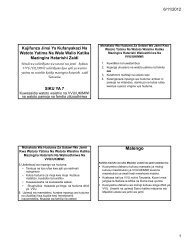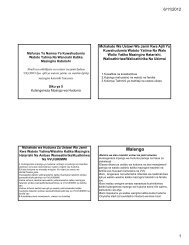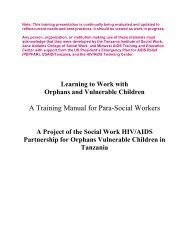Mobilizing Diaspora Volunteers for Public Health Capacity Building
Mobilizing Diaspora Volunteers for Public Health Capacity Building
Mobilizing Diaspora Volunteers for Public Health Capacity Building
Create successful ePaper yourself
Turn your PDF publications into a flip-book with our unique Google optimized e-Paper software.
aimed to build a consensus <strong>for</strong> the creation of an Ethiopian diaspora network to support Ethiopia’s AIDS<br />
prevention and treatment objectives. They concluded that, among the many obstacles hindering greater<br />
diaspora involvement in addressing Ethiopia’s AIDS challenges, the following were particularly<br />
important:<br />
A lack of in<strong>for</strong>mation in Ethiopia and among international donors concerning the expertise of<br />
overseas Ethiopians and the availability of overseas Ethiopians to undertake volunteer work in<br />
Ethiopia;<br />
Geographic dispersion among the diaspora and a general lack of organizational structures or<br />
systems to match their skills with opportunities to assist in Ethiopia’s HIV/AIDS campaign;<br />
An overreliance on in<strong>for</strong>mal methods of keeping in touch with current needs in Ethiopia,<br />
opportunities to assist, and points of contact;<br />
Discontent among some members of the diaspora concerning prior experience working in<br />
Ethiopia, and a lack of effective feedback and problem‐solving mechanisms in Ethiopia;<br />
Inconsistency of terms and conditions <strong>for</strong> diaspora assignments due to the wide variety and lack<br />
of coordination among the initiatives of independent individuals and organizations.<br />
Between February and May 2006, Visions <strong>for</strong> Development, Inc. conducted an in‐depth one hour<br />
interview to collect qualitative in<strong>for</strong>mation of selected high level health professionals such as physicians,<br />
nurses, epidemiologists, health planners, etc. The qualitative data collected revolved around the<br />
attitudes, perceptions and experiences of Ethiopian diaspora health professionals in the United States<br />
and Canada toward volunteering. The selection of these professionals <strong>for</strong> interview was not random but<br />
the results provide some instructive, although not readily generalized, insights into the pool of potential<br />
Ethiopian diaspora volunteer professionals. 12 Over four‐fifths of the 38 diaspora professionals<br />
interviewed indicated that they were “fairly” or “very” interested in taking up a volunteer assignment in<br />
Ethiopia to address the HIV/AIDS epidemic. Among these, many had extensive experience treating<br />
HIV/AIDS in the United States. Nearly half had visited Ethiopia within the past five years, mostly to visit<br />
family and friends, with a median stay of about one month. Most of the potential volunteers were<br />
motivated by a desire <strong>for</strong> personal satisfaction and <strong>for</strong> recognition of their acquired skills and expertise;<br />
assistance to their country of origin was considered a favorable outcome, but not a key motivation. In<br />
other words, the interest in volunteering was driven less by philanthropy and more by the emotional<br />
and social rewards they expected from volunteering.<br />
However, the interviews also pointed to substantial barriers. While there is a general consensus that<br />
longer or repeat volunteer engagement is more valuable <strong>for</strong> the recipient communities, nearly twothirds<br />
of the people surveyed indicated a preference <strong>for</strong> relatively short volunteer assignments of less<br />
than one month with a minimum of six months advance notice and lead time to prepare <strong>for</strong> the<br />
assignment. When asked more narrowly about their reticence to undertake more protracted volunteer<br />
work, interviewees most often pointed to concerns about job and career responsibilities in the United<br />
States (90 percent) and family responsibilities (50 percent); a lack of awareness of volunteer<br />
opportunities was less commonly cited as a barrier (29 percent). While the prospective participants<br />
acknowledged the need <strong>for</strong> financial and other support services in Ethiopia – as well as transportation –<br />
the lack of compensation was not a major barrier to volunteering. Moreover, the most important<br />
motivations appeared to be national pride, a sense of obligation, and a desire to apply their skills and<br />
expertise.<br />
12 In addition, the fact that the interviewer was a member of the Ethiopian diaspora may have influenced<br />
responses.<br />
<strong>Mobilizing</strong> <strong>Diaspora</strong> <strong>Volunteers</strong> <strong>for</strong> <strong>Public</strong> <strong>Health</strong> <strong>Capacity</strong> <strong>Building</strong> | 5



